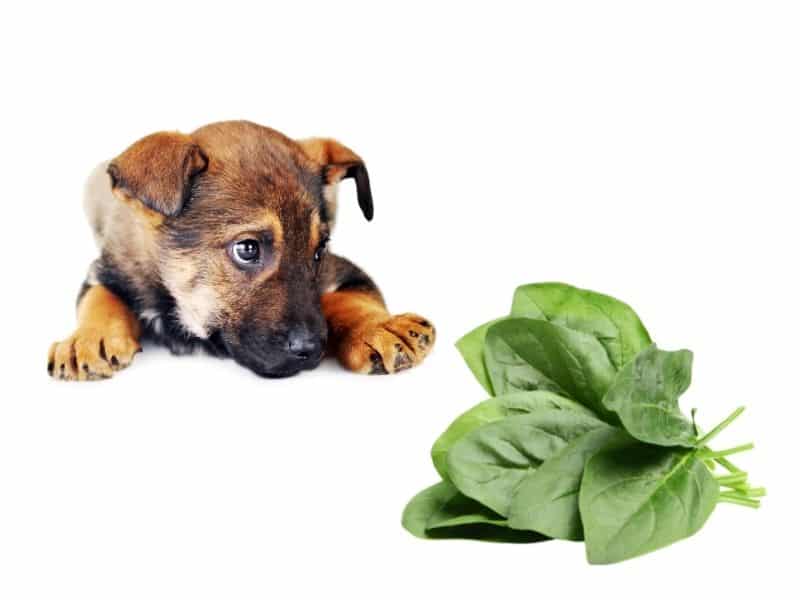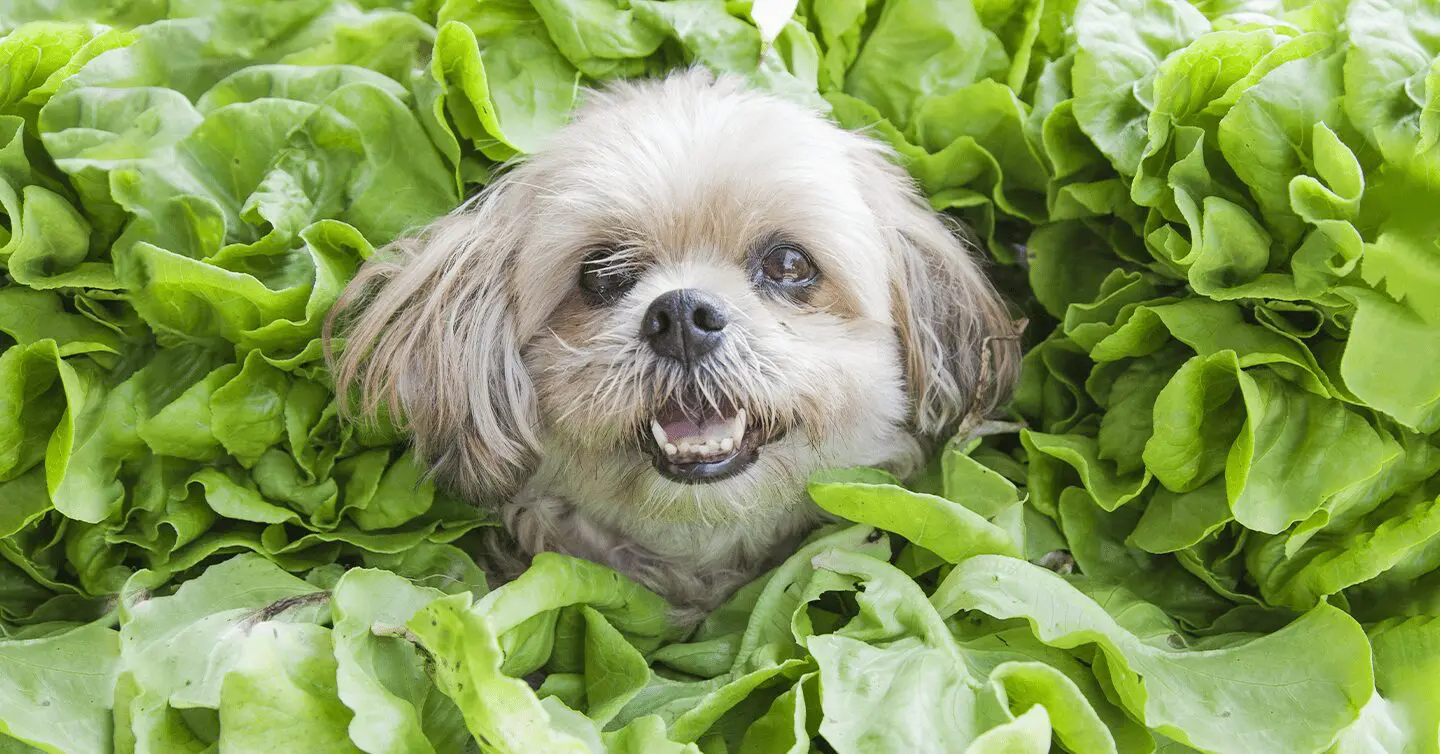Spinach is a nutrient-rich leafy green vegetable that many of us enjoy in our diets. However, when it comes to our furry friends, it's important to be cautious about the foods we feed them. So, can dogs eat spinach? Let's find out.

The safety of spinach for dogs is a topic of debate among pet owners and experts. While spinach does offer several health benefits for humans, whether it is safe and beneficial for dogs is a different story. In terms of the nutritional benefits of spinach for dogs, it is packed with vitamins, minerals, and fiber. It is low in calories and can provide a nutritious addition to their diet.
On the other hand, spinach contains oxalates, which can interfere with the absorption of calcium and potentially lead to kidney and urinary issues in large quantities. So, it is important to consider the potential risks of feeding spinach to dogs and consult with a veterinarian before introducing it into their diet.
If you choose to feed spinach to your dog, it is crucial to moderate the amount. Too much spinach can cause digestive upset or even harm their health. It is also essential to prepare and serve spinach properly.

While spinach can be a healthy addition to a dog's diet in moderation, it should never replace their balanced and species-appropriate meals. There are various other dog-friendly vegetables that can provide similar health benefits without the potential risks. It's best to consult with a professional to determine the best and safest vegetable options for your furry friend.
Key takeaways:
- Spinach can be beneficial for dogs: Spinach is a nutritious vegetable that can provide vitamins, minerals, and antioxidants for dogs when given in moderation.
- Caution should be exercised when feeding spinach to dogs: While spinach is generally safe for dogs, too much can lead to digestive upset, kidney issues, or interference with calcium absorption.
- Consult with a veterinarian: It is important to consult with a veterinarian to determine the appropriate serving size and suitability of feeding spinach to dogs based on their individual health and dietary needs.
Can Dogs Eat Spinach?
Yes, dogs can eat spinach in moderation. Incorporating spinach into a dog's diet can be a nutritious addition as it is rich in vitamins A, C, and K. However, it's important to prepare spinach properly by steaming or boiling it to break down the oxalic acid, which can be harmful to dogs in large amounts. Keep in mind that spinach should never be the main component of a dog's diet and should only be given as an occasional treat. Before introducing any new foods to your dog's diet, always consult with your veterinarian. Fun Fact: Spinach belongs to the same family as beets and Swiss chard, known as the Amaranthaceae family.
Is Spinach Safe for Dogs to Eat?
Is Spinach Safe for Dogs to Eat? Spinach can be a healthy addition to a dog's diet, but there are some considerations to keep in mind. Spinach is safe for dogs to eat in moderation, as long as it is cooked and served plain. Raw spinach contains oxalic acid, which can interfere with calcium absorption and potentially lead to kidney problems. It's important to avoid seasoning the spinach with ingredients like salt, garlic, or onion, as these can be harmful to dogs. If feeding spinach for the first time, start with small portions to ensure your happy dog tolerates it well. Always consult with your veterinarian before making any changes to your dog's diet.
What Are the Nutritional Benefits of Spinach for Dogs?
Spinach for dogs provides several nutritional benefits:
- Rich in vitamins A, C, and K, spinach promotes a healthy immune system.
- Being high in fiber, spinach aids digestion and prevents constipation in dogs.
- Spinach contains iron, which supports healthy blood circulation and prevents anemia.
- Packed with antioxidants, spinach helps to combat free radicals and reduce inflammation in dogs.
- Low in calories, spinach makes it a great option for dogs on a weight management diet.
When feeding spinach to dogs, it is important to:
- Cook spinach to make it easier for dogs to digest and reduce the risk of any harmful bacteria.
- Serve it in small portions as part of a well-balanced diet, not as a main meal.
- Avoid adding seasonings or oils that can be harmful to dogs.
Remember to consult with a veterinarian before introducing any new food to your dog's diet for specific recommendations and guidance.
Is Spinach Toxic to Dogs?
Is spinach toxic to dogs? Spinach is not toxic to dogs. However, it should be fed in moderation due to its high oxalic acid content. While small amounts can provide health benefits like improved digestion and boosted immune system, excessive consumption may lead to health issues such as kidney stress or calcium malabsorption. Symptoms of spinach overconsumption in dogs can include muscle weakness, abnormal heart rhythms, and kidney problems. It is important to consult with a professional veterinarian for portion sizes and serving ideas to ensure spinach is safely incorporated into a dog's well-balanced diet.
How Much Spinach Can Dogs Eat?
When it comes to feeding spinach to dogs, knowing how much spinach dogs can eat is crucial. Moderation is key when introducing this leafy green into their diet. It is recommended to give spinach to dogs in small amounts, about 10% of their daily food intake. Spinach offers a wide range of essential nutrients such as vitamins A, C, and K, as well as iron and fiber, which can greatly benefit their overall health. However, feeding dogs excessive amounts of spinach can result in gastrointestinal upset and hinder calcium absorption. To ensure the appropriate quantity of spinach for your furry friend, it is always wise to consult with your veterinarian.
Let me share a true story to illustrate the significance of portion control and understanding pets' dietary needs: A friend of mine once mistakenly served her dog a large bowl of spinach, considering it a healthy treat. Regrettably, the dog suffered from stomach discomfort and diarrhea. This incident taught us an invaluable lesson about the importance of accurately determining the appropriate amount of spinach for our beloved pets.
What are the Serving Sizes for Dogs?

When determining the serving size of spinach for dogs, it is important to consider their size and dietary needs. As a general guideline, dogs can be fed spinach as part of their regular meal or as a treat. The serving should only be a small portion, as too much spinach can lead to health issues such as kidney damage or metabolic imbalance. It is recommended to consult a veterinary professional for specific portion sizes based on your dog's individual needs. It is important to note that spinach should always be cooked before feeding to dogs to reduce the risk of digestive problems.
What are the Portion Recommendations for Dogs?
The portion recommendations for dogs vary based on their size and nutritional needs. Here are the portion recommendations for dogs:
Portion Recommendations for Dogs:
| Dog Size | Portion Size |
|---|---|
| Small | 1/4 to 1/2 cup per meal |
| Medium | 1/2 to 1 cup per meal |
| Large | 1 to 2 cups per meal |
To determine the appropriate portion size for your individual dog, it is important to consult with a professional veterinarian. Factors such as dog age, activity level, and overall health should be taken into consideration. Providing a well-balanced diet that includes a variety of nutrients is crucial for maintaining your dog's health and preventing any adverse effects from overeating or nutrient imbalances.
What are the Potential Risks of Feeding Spinach to Dogs?
Feeding spinach to dogs can have potential risks that pet owners should consider before incorporating it into their dog's diet. It's important to note that spinach contains oxalic acid, which can interfere with calcium absorption and potentially lead to kidney issues in dogs. In addition, spinach can also cause gastrointestinal upset, such as diarrhea or vomiting, if consumed in large quantities. To minimize these risks, it's recommended to thoroughly cook the spinach, remove any stems or tough parts, and only offer it as an occasional treat, rather than a regular part of their diet. As always, it's advisable to consult with a veterinarian before introducing any new dog food.
How to Feed Spinach to Dogs?
When it comes to feeding spinach to dogs, it's important to follow a few steps to ensure their safety and health:
- Start with small portions: Introduce spinach gradually into your dog's diet to gauge their tolerance.
- Wash and steam: Thoroughly wash spinach leaves to remove any pesticides and steam them to make them easier to digest.
- Chop or blend: Cut the spinach into small, manageable pieces or blend it into a puree.
- Mix with regular food: Incorporate the spinach into your dog's regular meals, either as a topping or mixed in.
- Monitor for digestive issues: Keep an eye out for any adverse reactions, such as upset stomach or diarrhea.
Historically, spinach was believed to be a superfood for dogs due to its high nutrient content. Recent studies have shown that while spinach can provide certain health benefits, it should be fed in moderation and prepared properly to avoid any potential digestive issues. Consulting with a veterinarian is always recommended before introducing new foods into your dog's diet.
Can Dogs Eat Raw Spinach?
Dogs can safely eat raw spinach in small portions as part of a well-balanced diet. Raw spinach offers numerous health benefits, including high fiber content, vitamins, and minerals. So, can dogs eat raw spinach? Yes, they can! However, it's important to keep in mind that spinach contains soluble oxalates, which can contribute to the formation of kidney and bladder stones in some dogs. Therefore, if your dog has a history of kidney problems or is prone to urinary issues, it is crucial to serve blandly cooked spinach. Additionally, always consult with a professional veterinarian before introducing new foods to your pet's diet. Remember, moderation is key when it comes to feeding your furry friend spinach or any other vegetable. By the way, an interesting fact is that spinach is also a great source of iron for dogs!

Can Dogs Eat Cooked Spinach?
Dogs can safely eat cooked spinach as part of a balanced diet. Cooked spinach provides several health benefits for dogs, including vitamins A, C, and K, as well as iron and fiber. It is important to feed spinach in moderation and in small portions. Too much spinach can lead to kidney stress and calcium malabsorption in dogs. Some dogs may have allergies or sensitivities to spinach, so it is important to monitor their response. Always consult with a professional veterinarian for more information on incorporating cooked spinach into your dog's diet.
| Can Dogs Eat Cooked Spinach? | |
|---|---|
| Health Benefits | Vitamins A, C, K, Iron, Fiber |
| Moderation | Feed in small portions |
| Potential Risks | Kidney stress, Calcium malabsorption |
| Allergies/Sensitivities | Monitor individual response |
| Consult Veterinarian | Professional advice |
Can Dogs Eat Spinach Leaves Only?
Feeding dogs spinach leaves only can be a healthy addition to their diet. Can dogs eat spinach leaves only? Spinach contains fiber, vitamins, and minerals that can benefit dogs when given in moderation. It is important to note that spinach leaves contain oxalic acid. Can dogs eat spinach leaves only if they are aware of the presence of oxalic acid? This acid can interfere with calcium absorption and potentially lead to health issues like kidney stones.
To prevent these risks, spinach leaves should be boiled or blandly cooked before giving them to dogs. Can dogs eat spinach leaves only after boiling or blandly cooking them? As always, it is best to consult with a professional veterinarian to ensure that spinach leaves, or any other vegetables, are safe and appropriate for your dog's specific dietary needs. Can dogs eat spinach leaves only? Consult a professional veterinarian to find out.
What Other Vegetables can Dogs Eat?
When it comes to feeding vegetables to your dog, there are several safe and healthy options to consider:
- Carrots: Crunchy and low in calories, carrots are a great source of vitamins and fiber.
- Green beans: High in fiber and low in calories, green beans can be a healthy snack for dogs.
- Sweet potatoes: Packed with vitamins and antioxidants, cooked sweet potatoes are a nutritious option for dogs.
- Peas: Rich in vitamins and minerals, peas can be a tasty addition to a dog's diet.
- Pumpkin: High in fiber and moisture, plain canned pumpkin can aid digestion.
- What Other Vegetables can Dogs Eat?: To provide a wider variety of nutrients, you can also explore other vegetables that are safe for dogs to consume.
Remember to always introduce new foods gradually and consult with your vet to ensure your dog's specific dietary needs are met.
What are the Dog-Friendly Vegetables?

Dog-friendly vegetables are a great way to enhance your pet's diet. So, what are the dog-friendly vegetables? Consider these options for your furry friend's health:
| - Carrots: These vitamin-rich and low-calorie vegetables can be enjoyed either raw or cooked. |
| - Green beans: With high fiber content and low calorie count, you can serve green beans steamed or even frozen as a refreshing treat. |
| - Sweet potatoes: Cooked sweet potatoes provide essential nutrients and can be served mashed or baked. |
| - Pumpkin: Not only does pumpkin aid in digestion, but it can also be served pureed or as a tasty treat. |
| - Broccoli: Rich in vitamins and low in calories, steamed broccoli is a healthy addition to your dog's meal. |
Remember to introduce these vegetables gradually and monitor your pet for any sensitivities. It's always important to consult with your veterinarian before making any significant changes to your dog's diet.
What Vegetables are Not Suitable for Dogs?
Not all vegetables are suitable for dogs. Some vegetables may cause health issues or pose risks to their well-being. It is important to be aware of the vegetables that are not suitable for dogs to ensure their safety. For example, onions and garlic can be toxic to dogs and cause damage to their red blood cells. Vegetables like avocados, mushrooms, and tomatoes can be harmful to dogs if consumed in large quantities. It is always best to consult with a veterinarian to determine which vegetables are safe and appropriate for your dog's diet.
I once knew a dog owner who mistakenly fed their dog a large amount of raw onions, unaware of the potential dangers. The dog became severely ill and had to be rushed to the veterinarian for treatment. It serves as a reminder to always be cautious about the types of vegetables we feed our furry friends.
Frequently Asked Questions
Q1: Can dogs eat spinach?
Yes, dogs can eat spinach.
Q2: Is spinach a superfood for dogs?
Yes, spinach is considered a superfood for dogs because it contains vitamins, minerals, and antioxidants.
Q3: Can dogs on a well-balanced diet supplement with spinach?
No, dogs on a well-balanced diet do not need to supplement with spinach.
Q4: Are there any negative effects of feeding dogs spinach in large amounts?
Feeding dogs spinach in large amounts can cause stomach upset and kidney damage due to the presence of isothiocyanates and oxalic acid.
Q5: Should canned spinach be given to dogs?
No, canned spinach should be avoided for dogs due to its high salt content.
Q6: What is the recommended way to feed dogs spinach?
The best way to feed dogs spinach is by steaming it and avoiding any seasonings or additives. Serve it in small portions alongside their usual meal.

